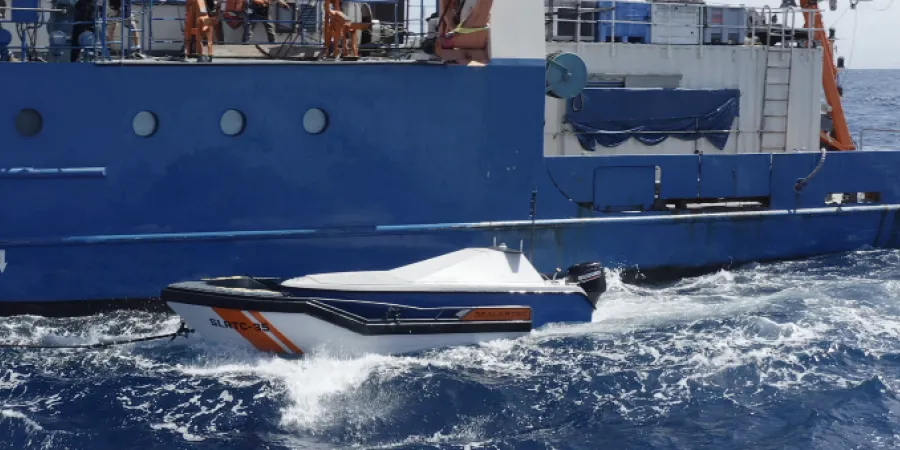Israel's Sealartec Demonstrates Robotic System for Launching, Recovering Drone Ships
The technology is capable of recovering manned or unmanned vessels even under rough sea conditions
IsraelDefense
| 01/07/2020
Sealartec, an innovative technology startup company, said June 30 that it conducted full sea trials of its groundbreaking robotic system for launching and recovering unmanned surface vessels (USVs).
During the series of trials in recent weeks off the coast of northern Israel, Sealartec demonstrated the capability of its unique system to perform precise and fully autonomous operations. A 5-meter Deep-V mono-hull USV was used for the tests amid sea state 4 conditions with gusting winds, the company said.
The tests took place as deployment of USVs in the maritime domain is increasing at a rapid pace. They carry out a range of activities including research and survey missions, securing of maritime assets, and support of oil and gas drilling. However, launch and recovery of unmanned vessels is extremely complicated, dangerous and limited by the state of the sea. This significantly degrades the effectiveness of the use of USVs as it involves considerable risk to the crews and potential damage to the launching platform, according to Sealartec.
Meanwhile, manned boats, including fast interceptor or rescue vessels, are being deployed on a daily basis worldwide, putting human lives at risk while operability is limited by sea state conditions and the maneuverability of mother ships. Sealartec’s unique solution tackles this challenge to ensure recovery of manned boats under almost any sea conditions, the company said.
Sealartec said its system, based on a patented technology in the fields of robotics and algorithmics, is capable of recovering any manned or unmanned vessel at conditions of up to sea state 6. It includes an innovative, hydrodynamic floating structure with robotic capture device and an autonomous process control decision-making algorithm. This combination allows safe recovery even under severe sea conditions while in motion, with a higher safety standard, according to the company.
Amitai Peleg, CEO of Sealartec, said "We are excited to successfully conclude a series of sea trials. The capability to launch and recover unmanned vessels at sea, safely and autonomously under the most rigorous conditions, addresses an acute need and will enable wider adoption of these vessels."
The technology is capable of recovering manned or unmanned vessels even under rough sea conditions
Sealartec, an innovative technology startup company, said June 30 that it conducted full sea trials of its groundbreaking robotic system for launching and recovering unmanned surface vessels (USVs).
During the series of trials in recent weeks off the coast of northern Israel, Sealartec demonstrated the capability of its unique system to perform precise and fully autonomous operations. A 5-meter Deep-V mono-hull USV was used for the tests amid sea state 4 conditions with gusting winds, the company said.
The tests took place as deployment of USVs in the maritime domain is increasing at a rapid pace. They carry out a range of activities including research and survey missions, securing of maritime assets, and support of oil and gas drilling. However, launch and recovery of unmanned vessels is extremely complicated, dangerous and limited by the state of the sea. This significantly degrades the effectiveness of the use of USVs as it involves considerable risk to the crews and potential damage to the launching platform, according to Sealartec.
Meanwhile, manned boats, including fast interceptor or rescue vessels, are being deployed on a daily basis worldwide, putting human lives at risk while operability is limited by sea state conditions and the maneuverability of mother ships. Sealartec’s unique solution tackles this challenge to ensure recovery of manned boats under almost any sea conditions, the company said.
Sealartec said its system, based on a patented technology in the fields of robotics and algorithmics, is capable of recovering any manned or unmanned vessel at conditions of up to sea state 6. It includes an innovative, hydrodynamic floating structure with robotic capture device and an autonomous process control decision-making algorithm. This combination allows safe recovery even under severe sea conditions while in motion, with a higher safety standard, according to the company.
Amitai Peleg, CEO of Sealartec, said "We are excited to successfully conclude a series of sea trials. The capability to launch and recover unmanned vessels at sea, safely and autonomously under the most rigorous conditions, addresses an acute need and will enable wider adoption of these vessels."



